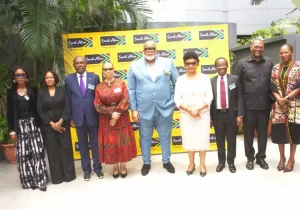In a strategic push to deepen trade, tourism, and investment ties between two of Africa’s largest economies, WESGRO—the official trade, investment, and tourism promotion agency for South Africa’s Western and Eastern Cape—hosted a high-level Business Networking Seminar from July 14–17 at the Federal Palace Hotel in Lagos.
The event drew top government officials, trade experts, investors, legal practitioners, entrepreneurs, and diplomats from both nations. Discussions centered on renewable energy, agribusiness, manufacturing, fintech, food and beverage, tourism, film, and the creative economy.
Welcoming the South African delegation, Lagos State Commissioner for Commerce, Cooperatives, Trade and Investment (MCCTI), Mrs. Folashade Kaosarat Bada Ambrose, described Lagos as a “dynamic megacity and living market ecosystem,” contributing over 60% of Nigeria’s non-oil manufacturing and 30% of national GDP.
“Lagos is not merely a city; it is a dynamic market ecosystem,” she said, highlighting frameworks like the LSDP 2052 and LSIP 2025–2030. She urged for bold cross-continental partnerships and highlighted investment opportunities in tourism, film, fashion, smart manufacturing, and infrastructure.
“Let today’s conversations lead to tomorrow’s investments. Lagos is open for bold, cross-continental partnerships that drive inclusive prosperity,” Ambrose said. She cited Lagos’s Export Readiness Programme training 250 MSMEs and called for triangular investment models across Africa in logistics, pharma, and renewable energy.
Chargé d’Affaires, acting Consul General, at the South African Consulate General in Lagos, Nigeria, Ms. Sebo Lenyai, applauded the strong Nigerian-South African business turnout. “It is inspiring to witness South African and Nigerian businesses come together to build meaningful partnerships,” she said.
Lenyai noted a significant increase in Nigerian tourism to South Africa, supporting economic and cultural growth. “The South African High Commission remains committed to supporting this momentum—through visa facilitation, trade cooperation, and working with partners like WESGRO to promote investment,” she stated.
Head of Africa International Trade at WESGRO, Michael Gamwo, emphasized the need for Africans to explore intra-continental trade to benefit from the AfCFTA. “This is not just about trade—it’s about building long-term cooperation. South Africa and Nigeria must lead by example,” he said.
Gamwo cited growing participation of South African SMEs in Nigeria in food, ICT, and engineering. He praised Nigeria’s swift e-visa system that allowed delegates to get travel approval in under 48 hours—a major improvement. “Such reforms allow agencies like WESGRO to focus on building partnerships, not solving visa issues,” he added.
While oil generates revenue, he said it is sectors like ICT, construction, and hospitality that drive local job creation. Gamwo reported over 60,000 Nigerians visited South Africa in 2024, with travel between the two countries rising by 20%. He invited Nigerian businesses to visit South Africa and explore investment opportunities, particularly in agribusiness, renewable energy, and ICT.
“The AfCFTA offers duty-free trade, but its success depends on joint implementation,” Gamwo said, referencing the 2016 Binational Commission (BNC). He called for greater promotion of Nigerian cultural assets and investment in MICE infrastructure.
Legal practitioner at Fola Sowemimo and Co Stirling PartnersDavid Nkire, stressed the role of legal professionals in cross-border partnerships. “Regulatory compliance, tax laws, and IP protections are crucial. Legal experts are key to building solid contracts and managing business risks,” he said.
Nkire commended recent Nigerian reforms, particularly policies that now allow foreign investors to repatriate funds—an improvement that boosts investor confidence. However, he urged further reforms in land titling, infrastructure, and exchange rate stability to improve the investment climate.
Executive Secretary of the Nigeria–South Africa Chamber of Commerce, Iyke Ejimofor, said the event proved the private sector is ready to lead intra-African trade. “Joint ventures in manufacturing, digital innovation, and creative industries can redefine African trade,” he said, highlighting value-added manufacturing, tech, and culture as growth pillars. He also referenced the Nigeria–South Africa Binational Commission’s strategic role.
WESGRO Nigeria Trade Events Facilitator and Founder of McKire Africa, Margaret ChiChi Nkire, emphasized the seminar’s tangible impact. “This is more than a one-off event—it empowers export-ready businesses and links value chains. Nigerian and South African SMEs now have stronger tools to thrive,” she said.
She explained WESGRO’s decade-long effort in organizing forums through collaborations with the South African Embassy, South Africa-Nigeria Chamber of Commerce, and South African Tourism. “Our goal is to connect businesses, promote joint ventures, and support long-term investments,” through market entry assistance to regulatory insights, Nigerian and South African SMEs now have stronger tools to thrive—pointing to sectors like tourism, agribusiness, manufacturing, ICT, food andbeverage, and film/creative industry which were represented by SA delegates.
Nkire underscored inclusive growth, with emphasis on empowering youth and women entrepreneurs. “Opening access to partnerships for young and female entrepreneurs is essential for sustainable development,” she added.
She also highlighted the creative industries—particularly film and television—as powerful engines for economic transformation, citing their global potential. “These engagements fuel job creation, digital innovation, and inclusivity,” she said. “They unlock scalable value for both nations.”
Among those present at the seminar were Mr. Lefentse Matlhaga, Vice Consul Political, South African Consulate General Lagos; Muiz Momodu, Trade Officer, South Africa High Commission Abuja; Mohammed Tanko, South African Tourism; Mr. Emmanuel Dangana, Lagos Chamber of Commerce; Yeye Nwidaa, Jackson Etti & Edu; and Kemi Lekebamtega, South African Airways.
As Commissioner Ambrose concluded, “Let our shared Pan-Africanism drive not just political solidarity but inclusive economic prosperity.”
With strategic platforms like the WESGRO seminar, that prosperity is no longer just a vision—it is becoming a shared reality.


